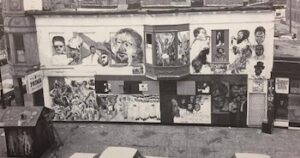
OBAC, Mural
*The Organization of Black American Culture (OBAC) was formed on this date in 1967.
Hoyt W. Fuller conceived OBAC as a collective of African American writers, artists, historians, educators, intellectuals, community activists, and others. The group was initially called Committee for the Arts (CFA), formed in Southside Chicago, Illinois. By May 1967, the group became OBAC and included Black intellectuals Hoyt W. Fuller (editor of Negro Digest), the poet Conrad Kent Rivers, and Gerald McWorter.
OBAC aimed to coordinate artistic support in the struggle for freedom, justice, and equality of opportunity for African Americans. The organization had workshops for visual arts, drama, and writing and produced two publications: a newsletter, Cumbaya, and the magazine Nommo. The organization's documents, OBA-C's purpose, and mission were:
· To work toward bringing the Black Community Indigenous art forms that reflect and clarify the Black Experience in America.
· To reflect the richness, depth, and variety of Black History and Culture.
· To provide the Black Community with a positive self-image of itself, its history, its achievements, and its possibility for creativity.
According to Fuller, OBAC, pronounced o-ba-see, was meant to "echo the Yoruba word oba, denoting loyalty and leadership." Jeff Donaldson chose the acronym OBAC, inspired by the Yoruba word Oba, meaning chief or leader. Margaret Burroughs hosted some of their initial public gatherings at the South Side Community Art Center.
After the visual arts and drama workshops closed, OBAC became a writers' workshop solely within a couple of years and continued in that form until 1992, surviving longer than any other literary group of the Black Arts Movement that flourished in the 1960s and 1970s.